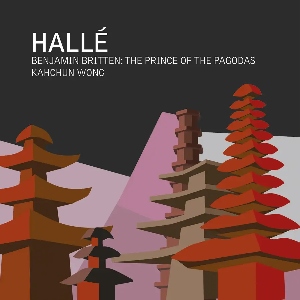
Benjamin Britten (1913-1976)
The Prince of the Pagodas, ballet in three acts (1954-1956)
Hallé Orchestra/Kahchun Wong
rec. 2023, Hallé St Peters, Ancoats, Manchester, UK
Hallé CDHLD7565 [2 CDs: 129]
It is a pleasant experience to encounter a new recording of Benjamin’s Britten’s 1957 ballet score The Prince of the Pagodas. As a symphonic work it is entertaining and colourful. Britten unfortunately never got around to putting together a symphonic suite of this music. It is disappointing that Donald Mitchell and Mervyn Cooke’s undertaking to assemble one (review) doesn’t seem to have increased the opportunities to encounter this intriguing music in the concert hall; especially as productions of the full ballet are fairly rare occurrences.
Auditioning these new CDs brings an immediate first impression of a tightly knit performance from the Hallé players. Conductor Kahchun Wong shows an impressive sensitivity to Britten’s subtleties of orchestration. The playing from the orchestra is simply a delight throughout the entire 2 plus hours.
Such highlights as the distantly approaching fanfares of the first act are well captured by the recording team. Wong has immersed himself in Britten’s musical language successfully and he also brings his own Asian cultural background to the table in his remarkable performance with the orchestra. I was especially pleased to hear the beautiful way in which the solo harp figures register with delicacy at the point when the Kings are kneeling before Belle Rose. Wong also captures nicely the unusual sauntering mode that kicks-off the march which then later transforms into a more traditional march tempo. Britten was ever original in his approach to standard musical forms.
The centerpiece of any performance of this ballet is the almost 20 minute sojourn into the Land of the Pagodas which concludes the Second Act. Here Britten’s colourful imitation of the sounds of a Gamelan ensemble is cleverly mimicked by the traditional percussion instruments of a symphony orchestra. I have had the opportunity to attend a performance of a Gamelan concert several years ago, the experience has convinced me just how perfect a facsimile Britten’s composition and orchestration of this scene is. The percussion section of the Hallé orchestra really deserve star billing here for the dazzling display they bring to the music. Experiencing this scene which is musically different from the rest of the ballet is an auditory experience equivalent to witnessing young Judy Garland’s sudden arrival in the Technicolor wonders of Munchkinland in the 1939 film The Wizard of Oz.
A comparison of the second act fire music is most illuminating as to the differing qualities that are inherent to each of the versions which have appeared on CD. The current one presents a rich soundstage that is nicely detailed and refined in terms of the sound quality. Turning to Oliver Knussen’s recording for Virgin Classics with the London Sinfonietta (review), it reveals an orchestral landscape that is even wider than the Halle’s. It leaves one with a feeling of having experienced the sonic and orchestral equivalent of Cinerama. Knussen’s approach couples Wong’s sensitivity with a bolder reading than the Asian conductor. Turning to the original 1957 recording with the Royal Opera House Orchestra conducted by the composer brings a surprise. Britten has always struck me as a rather cerebral conductor but the passion and fervor with which he tackles the fire music is utterly riveting and brings the experience of this work to a whole new level of excitement. The sound, despite some thinness in the upper strings and brass, remains quite spectacular for its age. This would be my top recommendation were it not for the fact that about 20 minutes of the score was cut for commercial reasons. Yet it remains the most thoroughly engrossing account of the ballet overall.
Halle’s presentation of the CDs is decent enough, in a double jewel case that contains a booklet with some rather boring artwork on the cover. There is a well written article on the work’s background and composition. However, the two sentence summary of the plot is simply too brief to give the prospective listener anything to latch on to in navigating one’s way through this marvelous score. The time and effort that was invested in recording this work over six days in 2023 surely deserved more endeavor in producing a booklet which would do justice to the achievement.
Overall this is worth seeking out although it doesn’t displace Knussen’s recording if one already has that. Britten’s somewhat abridged version remains a special achievement that demands hearing despite the fact that one ideally wants to own a complete recording of this marvelous work.
Mike Parr
Previous reviews: Jim Westhead (October 2024) ~ John Quinn (February 2025)
Buying this recording via a link below generates revenue for MWI, which helps the site remain free




















